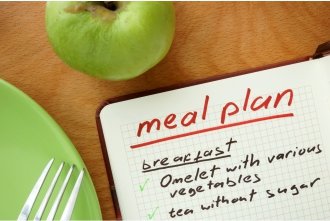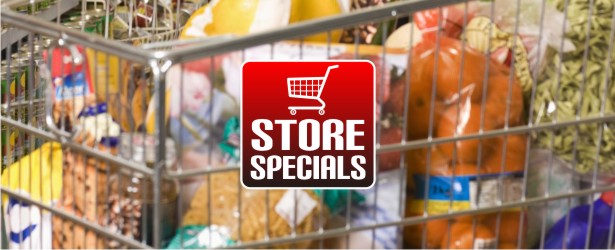
By Stephanie Simons,
Head Pharmacist,
Lindo’s Pharmacy in Devonshire
It’s March, which means that it is National Nutrition Month. It’s a great time to focus on ways that you can ensure you are getting the daily nutrients you need and more for optimal health.
However, this month brings awareness to much more than what we should and shouldn’t eat. Let’s break it down with some top tips to combine good nutrition and a healthy lifestyle.
Get outside more.
The weather is warming up now and we are gearing up for summer. If you have been inside most of the winter, or if you have a job that keeps you in an office all day, it’s time to get yourself outside to enjoy some of Bermuda’s national parks.
Take a bike ride or a walk along the railway trails, feel the sand between your toes at a beach you haven’t been to in a while, explore Tom Moore’s jungle or climb the lighthouse for a spectacular view of our island.
Adults should aim for 30 minutes of moderate-intense activity five times per week. If you are busy, you can spread it out throughout the day by doing ten minutes at a time. Lunch breaks are the perfect excuse for a walk, or even a few light stretches to ease any tension from sitting at a desk.
Fitness events are a great way to get motivated. The Lindo’s to Lindo’s 5K run and 4-mile walk is coming up on Sunday, March 13. For more information on how to sign-up, visit the Lindo’s website: https://lindos.bm/lindos-10k-run-4-mile-walk-2016/.
Take a break.
Did you know that how, when, why and where you eat are just as important as what you eat? Take the time to enjoy your surroundings while you eat, and you will enjoy your food even more. At times it is impossible to avoid eating on-the-go, but generally you should avoid multitasking while you eat.
Read the labels.
 ‘Everything in moderation’ is a term we are all familiar with, but the problem is that unhealthy ingredients, such as sugars and salt, can be hidden in our foods.
‘Everything in moderation’ is a term we are all familiar with, but the problem is that unhealthy ingredients, such as sugars and salt, can be hidden in our foods.
Natural sugars are found in fruits, but the real issue is refined sugars. Look out for the following words; high fructose corn syrup, dried cane syrup, evaporated cane juice, invert sugar, molasses, sucrose, brown rice syrup, honey, agave or maple syrup. Try to minimize these sources of refined sugars.
A simple way to help reduce your sugar intake is to drink more water, which will keep you hydrated, less hungry, and help you avoid sugary drinks. Also, choose snacks with no added sugar. Grilled fruits, such as pineapple, can be a delicious dessert and contains only natural sugars.
Salt is usually labelled as sodium. It is important to make sure that you choose foods with less sodium. It all adds up, so also try not to add salt to your meals.
Most salt is added to food during the processing stage, so one easy way to reduce the amount of salt you consume is to eat cuts of fresh meats and use fresh fruits and vegetables. If you buy frozen or canned foods, seek out ones with no added salt.
Flavour your own foods.
Be inspired and flavour your foods with citruses, herbs and spices instead of readymade and pre-packaged sauces or salt.
Healthy food doesn’t have to be bland. You can find quick and easy recipes that will bring a world of new flavours to your palette. You may also find it is more satisfying to eat when you make it yourself.
Plan Ahead.
 It’s an easy mistake to get caught with no food in the fridge and find yourself with unhealthy takeout for dinner. The best way to avoid this is to plan ahead. Making a healthy weekly menu on Saturday or Sunday and buying ahead can make things easier when you get busy during the week.
It’s an easy mistake to get caught with no food in the fridge and find yourself with unhealthy takeout for dinner. The best way to avoid this is to plan ahead. Making a healthy weekly menu on Saturday or Sunday and buying ahead can make things easier when you get busy during the week.
Be aware of portion sizes.
We have become accustomed to bigger portions, which is causing us to over eat. Take control of portion sizes, and you will feel much better. There are some easy steps that you can take to help control the amount you eat:
Use smaller plates – It is human nature to want to fill a plate, no matter the size. If you have a smaller plate, that means that you will still feel like the plate is full of food, but you will consume less.
Eat less, more often – Keep hunger at bay by making sure you include healthy snacks in your daily routine. This will help you to avoid indulging on a big meal. It is also important not to skip any meals.
Look at the serving size on the label – Most things that we buy contain more than one serving, so make sure you know how many servings you are consuming and take into account the amount of calories each serving contains.
Talk to an expert.
There is a lot of diet information on the internet — almost too much. Squeezing time into your busy lifestyle to research and build a nutrition plan yourself may seem impossible. Luckily there are expert nutritionists available to do all the hard work and find an eating plan that is right for you. And, of course, ask your doctor for some advice on your specific nutrition needs.
Think about supplements that can assist your diet.
As we get older the body requires higher amounts of certain nutrients. Speak to your pharmacist to find out more about dietary supplements that may benefit you and fill in your nutrition gaps.
These are just a few tips to help you start thinking about little things that you can do to improve your nutrition, and be on the way to a healthier lifestyle. For more tips on how to eat well, you can visit the Department of Health’s “Eat Well” resource at http://www.eatwell.gov.bm/portal/server.pt
Stephanie Simons is the head pharmacist at Lindo’s Pharmacy in Devonshire. She earned her Bachelor of Science in Pharmacy at Massachusetts College of Pharmacy and has been practicing for over 20 years. She is a registered pharmacist with the Bermuda Pharmacy Council and is a member of the Bermuda Pharmaceutical Association.


